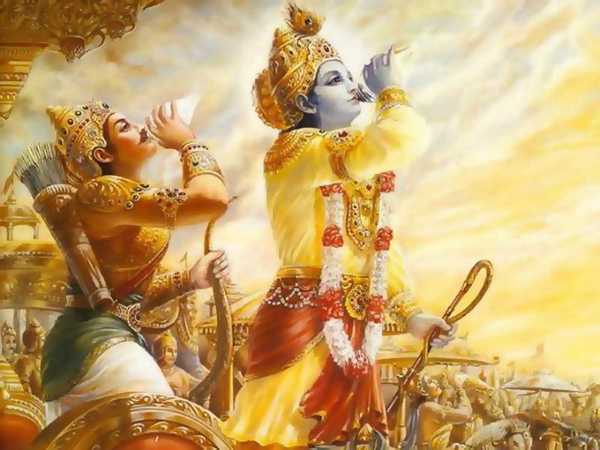Chapter 176

Vaisampayana said, “When they had left their happy home in the beautifulmountain abounding in cascades, and having birds, and the elephants ofthe eight quarters, and the supernatural attendants of Kuvera (asdwellers thereof), all happiness forsook those foremost of men ofBharata’s race. But afterwards on beholding Kuvera’s favourite mountain,Kailasa, appearing like clouds, the delight of those pre-eminent heroesof the race of Bharata, became very great. And those foremost of heroicmen, equipped with scimitars and bows, proceeded contentedly, beholdingelevations and defiles, and dens of lions and craggy causeways andinnumerable water-falls and lowlands, in different places, as also othergreat forests inhabited by countless deer and birds and elephants. Andthey came upon beautiful woodlands and rivers and lakes and caves andmountain caverns; and these frequently by day and night became thedwelling place of those great men. And having dwelt in all sorts ofinaccessible places and crossing Kailasa of inconceivable grandeur, theyreached the excellent and surpassingly beautiful hermitage ofVrishaparba. And meeting king Vrishaparba and received by him being theybecame free from depression and then they accurately narrated in detailto Vrishaparba the story of their sojourn in the mountains. And havingpleasantly passed one night in his sacred abode frequented by gods andMaharshis, those great warriors proceeded smoothly towards the jujubetree called Visala and took up their quarters there. Then all thosemagnanimous men having reached the place of Narayana, continued to livethere, bereft of all sorrow, at beholding Kuvera’s favourite lake,frequented by gods and Siddhas. And viewing that lake, those foremost ofmen, the sons of Pandu traversed that place, renouncing all grief even asimmaculate Brahmana rishis (do) on attaining a habitation in the Nandanagardens. Then all those warriors having in due course happily lived atBadari for one month, proceeded towards the realm of Suvahu, king of theKiratas, by following the same track by which they had come. And crossingthe difficult Himalayan regions, and the countries of China, Tukhara,Darada and all the climes of Kulinda, rich in heaps of jewels, thosewarlike men reached the capital of Suvahu. And hearing that those sonsand grandsons of kings had all reached his kingdom, Suvahu, elated withjoy, advanced (to meet them). Then the best of the Kurus welcomed himalso. And meeting king Suvahu, and being joined by all their charioteerswith Visoka at their head and by their attendants, Indrasena and others,and also by the superintendents and servants of the kitchen, they stayedthere comfortably for one night. Then taking all the chariots andchariot-men and dismissing Ghatotkacha together with his followers, theynext repaired to the monarch of mountains in the vicinity of the Yamuna.In the midst of the mountain abounding in waterfalls and having grey andorange-coloured slopes and summits covered with a sheet of snow, thosewarlike men having then found the great forest of Visakhayupa like untothe forest of Chitraratha and inhabited by wild boars and various kindsof deer and birds, made it their home. Addicted to hunting as their chiefoccupation, the sons of Pritha peacefully dwelt in that forest for oneyear. There in a cavern of the mountain, Vrikodara, with a heartafflicted with distraction and grief, came across a snake of hugestrength distressed with hunger and looking fierce like death itself. Atthis crisis Yudhishthira, the best of pious men, became the protector ofVrikodara and he, of infinite puissance, extricated Bhima whose wholebody had been fast gripped by the snake with its folds. And the twelfthyear of their sojourn in forests having arrived, those scions of the raceof Kuru, blazing in effulgence, and engaged in asceticism, always devotedprincipally to the practice of archery, repaired cheerfully from thatChitraratha-like forest to the borders of the desert, and desirous ofdwelling by the Saraswati they went there, and from the banks of thatriver they reached the lake of Dwaitabana. Then seeing them enterDwaitabana, the dwellers of that place engaged in asceticism, religiousordinances, and self-restraining exercises and in deep and devoutmeditation and subsisting on things ground with stone (for want of teeth)having procured grass-mats and water-vessels, advanced to meet them. Theholy fig, the rudaraksha, the rohitaka, the cane and the jujube, thecatechu, the sirisha, the bel and the inguda and the karira and pilu andsami trees grew on the banks of the Saraswati. Wandering about withcontentment in (the vicinity of) the Saraswati which was, as it were, thehome of the celestials, and the favourite (resort) of Yakshas andGandharvas and Maharshis, those sons of kings lived there in happiness.”




